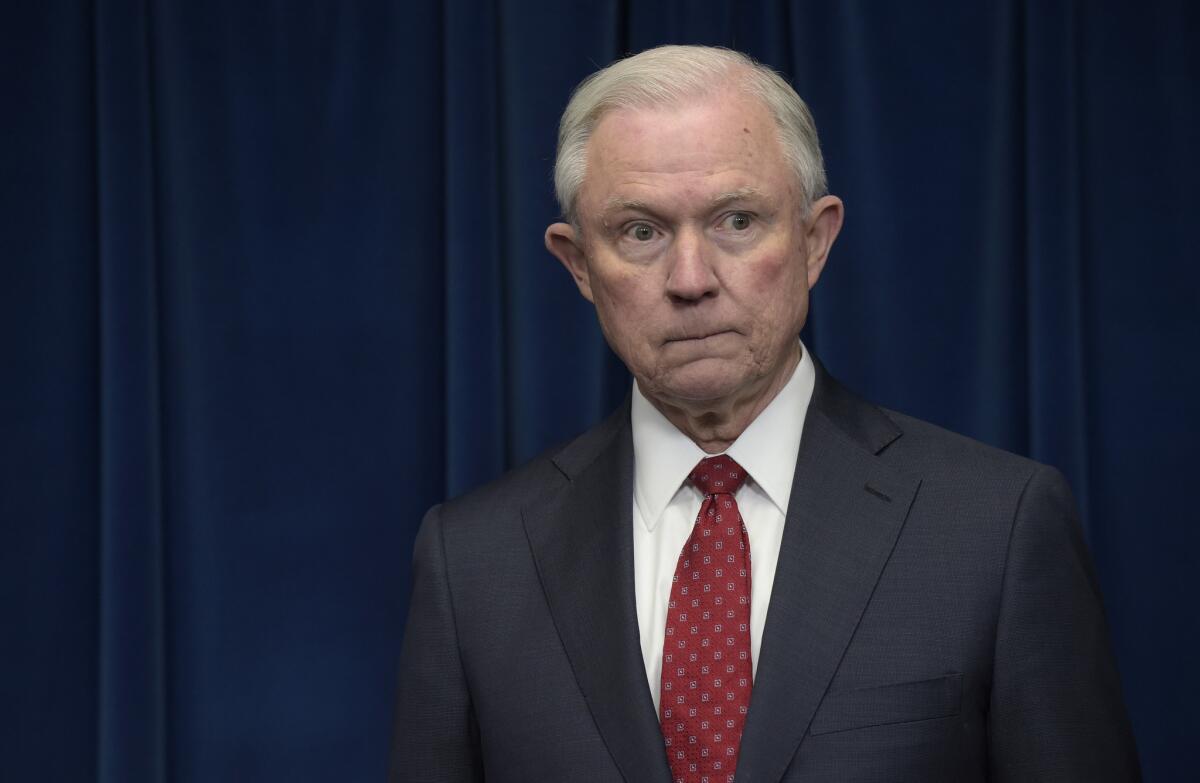Civil rights groups alarmed at Justice Department’s review of local police settlements

Reporting from Washington — Civil rights groups and experts on police reform expressed alarm Tuesday at Atty. Gen. Jeff Sessions’ order for a review of more than a dozen federal agreements with police forces that address problems of racial profiling, discrimination and use of excessive force.
The broad review reflects the Trump administration’s emphasis on bolstering law and order over investigating allegations of police misconduct, and it could lead to changing or scaling back consent agreements or negotiations underway in several cities, including Baltimore and Chicago.
Proposed consent decrees could be scrapped or overhauled in both cities, officials said, despite Justice Department investigations that uncovered systemic problems in their police departments.
The review also could affect an ongoing investigation by the Justice Department’s Civil Rights Division and the U.S. Attorney’s Office for the Central District of California into police patterns and practices in the Orange County Sheriff’s Department.
The administration can’t unilaterally unwind consent decrees without court approval, so it’s unclear whether Sessions’ directive could affect the negotiated settlement that led to federal oversight of the Oakland Police Department, which was the result of a 2003 lawsuit.
The Justice Department has recommended 272 changes to help improve the scandal-ridden San Francisco Police Department, but the six-month investigation last year did not lead to a consent decree or a federal takeover.
The Justice Department “is signaling it no longer intends to fully support police reform even in consent decrees they are already active in,” said Christy Lopez, who led the Justice Department’s police investigation efforts under the Obama administration and now is a Georgetown University law professor. “I think it’s incredibly cynical.”
Lopez said Sessions is signaling that the Justice Department has intruded too far into oversight of local policing, even as the administration threatens to withhold federal grants from cities and other jurisdictions that do not help federal agencies locate and arrest immigrants in the country illegally.
Sessions, a critic of federal investigations of local police, wrote in a two-page memo released Monday that the “misdeeds of individual bad actors should not impugn or undermine the legitimate and honorable work that law enforcement officers and agencies perform.”
Sessions said he had ordered his two top deputies to review “collaborative investigations and prosecutions, grant making, technical assistance and training, compliance reviews, existing or contemplated consent decrees and task force participation.”
The Justice Department has 14 such agreements with local police departments, including a high-profile accord reached with the city of Ferguson, Mo. It was hammered out in the aftermath of the fatal police shooting of an unarmed young black man in 2014, which was followed by weeks of street protests.
Such decrees are reached in court, overseen by a federal judge and stipulate changes that local law enforcement agencies must make in response to a Justice Department investigation.
During the Obama administration, the Justice Department launched more than two dozen investigations into local law enforcement agencies accused of misconduct. The goal was to improve both policing and their community relations.
Justice Department officials sought to downplay the review Sessions has ordered, saying it was normal for a new administration to examine policies and procedures inherited from a previous president.
Sessions and his team are “actively developing strategies to support the thousands of law enforcement agencies across the country that seek to prevent crime and protect the public,” Justice Department spokesman Ian Prior said in a statement.
“The department is working to ensure that those initiatives effectively dovetail with robust enforcement of federal laws designed to preserve and protect civil rights,” Prior said. “While this memo includes the review of any pending consent decrees, the attorney general also recognizes the department’s important role helping communities and police departments achieve these goals.”
Samuel Walker, who has written extensively about police accountability, said police chiefs across the country have moved toward stricter controls on use of force, including “de-escalation” tactics and greater transparency and review.
He said the shift by Sessions probably won’t derail that momentum.
“The attorney general and the president can set the tone, and I think they’re setting the wrong tone, but the local police chief has the ability to nullify that,” said Walker, a retired professor of criminal justice at the University of Nebraska at Omaha.
On Monday, the Justice Department took its first step under Sessions’ order by asking a federal judge to pause court proceedings for 90 days involving a proposed consent decree affecting Baltimore’s police force.
Baltimore officials and the Justice Department reached the wide-ranging agreement in the waning days of the Obama administration to address a pattern of discrimination and unconstitutional policing. That investigation was sparked by the 2015 death of another black man, 25-year-old Freddie Gray, from injuries suffered while he was in police custody.
In its court filing, the Justice Department asked for the three-month pause so its new leadership could review the proposed agreement to assess whether the court-ordered initiatives “will help ensure that the best result is achieved” for Baltimore’s residents.
A hearing is set for Thursday to allow U.S. District Judge James K. Bredar, who is overseeing the negotiations, to gather public comments on the proposed agreement.
Baltimore’s leaders, including its mayor and police commissioner, announced opposition to the proposed pause.
“Any interruption in moving forward may have the effect of eroding the trust that we are working hard to establish,” Baltimore Mayor Catherine Pugh said.
The Justice Department is also certain to review its determination that the Chicago police force was systematically abusive, following a series of police shootings of minorities.
In January, the department issued a scathing report that found that Chicago officers were poorly trained and quick to use excessive force. The report also found the Police Department tolerated racial discrimination.
Negotiations on a potential agreement between Chicago and the Justice Department have been in the works. In a joint statement Monday night, Mayor Rahm Emanuel and Police Supt. Eddie Johnson said Sessions’ review would not alter their plans to reform police practices.
Sessions said last month that he had read a summary of the Justice Department report on Chicago and that he worried police officers on the streets were pulling back because they feared getting in trouble if they made a mistake.
“We need to help police departments get better, not diminish their effectiveness, and I’m afraid we have done some of that,” Sessions told a gathering of state attorneys general. “So we’re going to pull back” on federal investigations of police departments.
A Virginia-based nonprofit group called Americans for Limited Government praised Sessions’ decision.
“At a time when cities like Chicago and Baltimore face horrifying homicide rates that disproportionately impact their least fortunate citizens, it would be irresponsible to blindly continue Obama’s war on the police,” it said.
Civil rights advocates said they are concerned about how the Trump administration will respond to police abuses.
“This directive makes clear that the attorney general sees little to no role for the federal government to play in promoting policing reform, even in those communities where the problems are greatest,” said Kristen Clarke, president of the Lawyers’ Committee for Civil Rights Under Law, a nonprofit group that has sought greater federal oversight of troubled police departments.
Michael Gennaco, former chief attorney for Los Angeles County’s Office of Independent Review, which was created to monitor the county Sheriff’s Department, noted that the Los Angeles Police Department operated under a federal consent decree for years after the Rampart police scandal in the 1990s and that it helped push the department toward stronger accountability measures.
“One way I describe it is a nuclear option,” Gennaco said. “Certainly the specter of having a [Justice Department] pattern-and-practice investigation serves as a deterrent, or at least as an incentive for jurisdictions to move forward on progressive policing measures.”
Times staff writer Wilber reported from Washington and Baltimore Sun reporter Rector reported from Baltimore. Times staff writer Joseph Tanfani contributed from Washington.
[email protected] | Follow @delwilber on Twitter
ALSO
Justice Department watchdog finds DEA cash seizure program may pose risk to civil liberties
Jeff Sessions asks 46 Obama-appointed U.S. attorneys to resign
More to Read
Get the L.A. Times Politics newsletter
Deeply reported insights into legislation, politics and policy from Sacramento, Washington and beyond. In your inbox three times per week.
You may occasionally receive promotional content from the Los Angeles Times.











